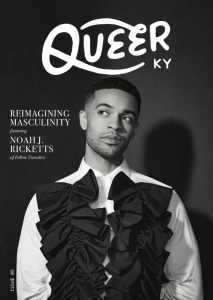White women talking like white gay men, talking like Black women: notes on white feminism, white queerness, and cultural appropriation
White gay men have been borrowing from Black woman culture for as long as Black drag queens have been running the ballroom / drag show scene. Black woman vernacular is now so ingrained in queer culture that white people, queer and straight alike, think that gay men and Black women sound the same – as if by coincidence.
Another word for this type of “borrowing” is cultural appropriation. When is cultural appropriation problematic, and when is it acceptable? The answer is not always clear cut, but a good rule of thumb is: if you belong to a dominant group (say, white folks), and you’re borrowing from a minority group whose oppression you benefit from (say, Black folks), then you need to be extremely careful, and probably get permission. If the group tells you it’s hurtful/offensive, it’s best to take their word for it.
White queers, white gay men in particular, have been appropriating Black woman culture for decades. Our excuse is that we also belong to a disadvantaged minority group. And disadvantaged minority groups can appropriate from each other, right? Wrong.
White gay men, while they are still disciminated against by virtue of their sexuality, enjoy white privilege as well as male privilege: the two most potent forms of power in the world. Conversely, Blackness and femaleness/femmeness are two of the greatest disadvantages a person can have, when it comes to social power and status. Gays have experienced their own horrific injustices, certainly. But this does not give us a free pass to steal whatever from whoever.
White gays/queers appropriating Black woman culture is problematic for another reason: it makes white straight women feel that it is acceptable for them to do the same. To quote Karen: “Kevin is my bestie, and this is how we talk to each other. Like, I’m not racist, I just love the gays!” Now Kevin and Karen feel justified in appropriating Black woman culture, even while both of them benefit from the oppression of Black women. And whether Karen is aware of it or not, there is a long, ugly history of white feminism excluding black women from the (white) women’s liberation movement. Historically, feminism has only been for white women: usually upper-middle-class, white women. In the words of blogger ShaRhonda Knott-Dawson, “Plenty of white women’s suffrage leaders held racist, white supremacist views and worked against the freedom of Black women.”
One type of appropriation that is never okay is Blackface: a harmful tradition that originated in the mid-19th century, with white minstrels painting their faces and exaggerating their features to perform as stereotypical Black characters. Some other, more current examples of Blackface include: bigoted sports team names and mascots, and costumes that play on racial stereotypes. Perhaps the newest manifestation of this harmful tradition is ‘digital Blackface”: white people sending reaction GIFs that contain images of Black people making exaggerated expressions, thereby reducing Black people to stereotypes for their own amusement. It’s not just white gays who do this—white straights do it too. But here, too, white gays are often given a social pass, because we belong to a marginalized group.
No one likes being called out, and no one likes to admit that they are racist. But as white folks, it’s our duty to acknowledge that we are all racist on some level. That is to say, each of us has not only benefited from, but also contributed to, the systemic oppression of Black people.
I used to be one of the queers at the gay club—thinking I was just talking like a gay man—but impersonating a Black woman. I have also been guilty of other offenses, committed out of ignorance. When I was a teenager living in a small town in rural North Dakota, I had dreadlocks. I wore my dreads for years, not seeing any problem with it. Years later, I look back on that choice with regret and embarrassment. I make these “confessions” not to ask for forgiveness, or to absolve my guilt, but to normalize the practice of owning up to my ignorance and mistakes as a white person: rather than sweeping those offenses under the rug, or defending them, or making excuses.
Just because we’ve been appropriating Black culture for years, doesn’t make it ours, and doesn’t make it less problematic. Our ignorance doesn’t absolve our racism. And neither does our queerness. There are a million GIFs, words, and phrases that white queers can use that don’t rely on racial stereotypes or cultural appropriation. It’s time we got creative. And it’s time we got proactively anti-racist.












Leave a Reply
Want to join the discussion?Feel free to contribute!